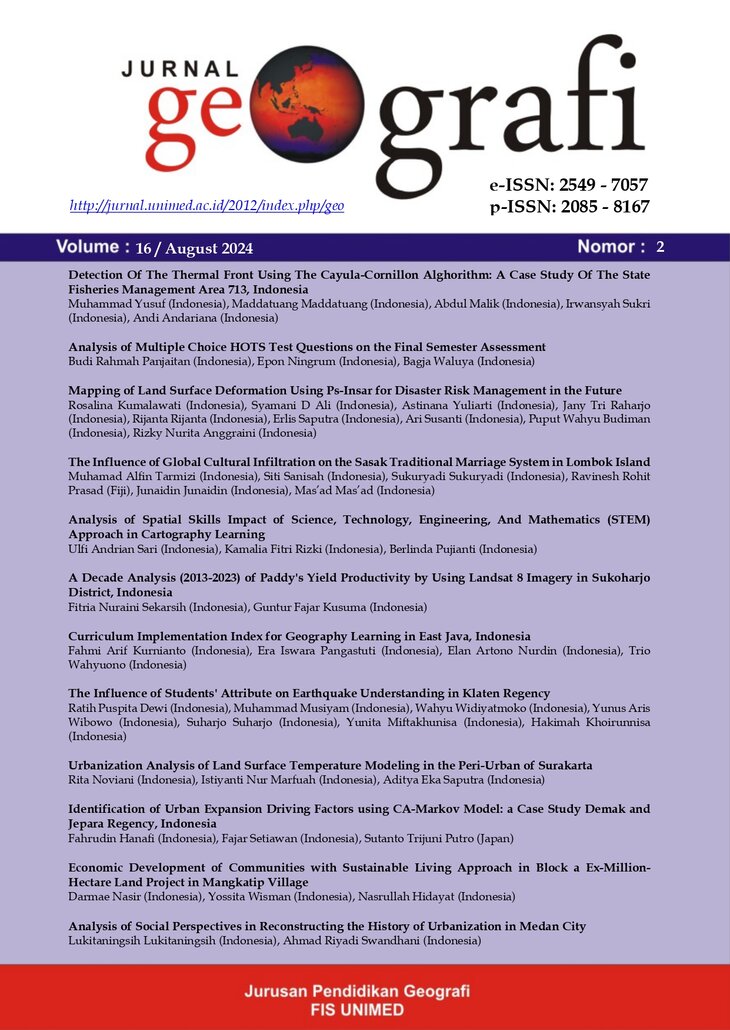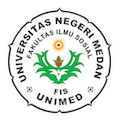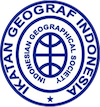Curriculum Implementation Index for Geography Learning in East Java, Indonesia
DOI:
https://doi.org/10.24114/jg.v16i2.49818Abstract
Curriculum changes often occur in Indonesia. However, studies regarding the gap between curriculum planning and implementation are still very limited. Therefore, this study aimed to analyze the Curriculum Implementation Index for Geography Learning in East Java. In this study, we used a curriculum implementation index for geography subjects. This study used purposive sampling with several considerations, such as the region distribution of geography teachers and school accreditation. The number of respondents is determined by selecting the person directly related to geography learning and its relation to curriculum implementation. We observed 30 geography teachers to determine curriculum implementation. The curriculum implementation index was used to evaluate consistency between curriculum planning and implementation, as indicated by teachers™ activities and several concepts in geography learning. The results show that the readiness of teachers to implement the curriculum in the laboratory, literature, and media aspects is in the low category. This is indicated by a laboratory index of 1.03, a literature index of 1.58, and a media index of 1.87. This low index means that geography learning does not meet the 2013 curriculum standards, especially in physical geography material, which needs laboratories and media to explain concrete concepts in geography learning. Implementing the 2013 curriculum in geography learning has not met the characteristics of the concrete idea of geography learning, which requires visualization for physical and environmental aspects.Keywords: Curriculum Implementation; Geography Learning; Index; East JavaReferences
Al-Awidi, H., & Aldhafeeri, F. (2017). Teachers' readiness to implement digital curriculum in Kuwaiti Schools. Journal of Information Technology Education, 16(1), 105-126. https://doi.org/10.28945/3685.
Anđelković, S., Dedjanski, V., & Pejic, B. (2018). Pedagogical benefits of fieldwork of the students at the faculty of geography in the light of the bologna process. Journal of Geography in Higher Education, 42(1), 110-125. https://doi.org/10.1080/03098265.2017.1379058.
Arksey, H., & Knight, P. (1999). Interviewing for social scientists. London: Sage.
Ayuni, F. N. (2015). Pemahaman guru terhadap pendekatan saintifik (scientific approach) dalam pembelajaran geografi. Jurnal Geografi Gea, 15(2). https://doi.org/10.17509/gea.v15i2.3542
Bahri, S. (2017). Pengembangan kurikulum dasar dan tujuannya. Jurnal Ilmiah Islam Futura, 11(1), 15-34. http://dx.doi.org/10.22373/jiif.v11i1.61.
Baker, T. R., Battersby, S., Bednarz, S. W., Bodzin, A. M., Kolvoord, B., Moore, S., . . . Uttal, D. (2015). A research agenda for geospatial technologies and learning. Journal of Geography, 114(3), 118-130. https://doi:10.1080/00221341.2014.950684.
Bengel, P. T., & Peter, C. (2021). Modern technology in geography education”attitudes of pre-service teachers of geography on modern technology. Education Sciences, 11(11), 1-17 https://doi:10.3390/educsci11110708.
Bernhäuserová, V., Havelková, L., Hátlová, K., & Hanus, M. (2022). The limits of GIS implementation in education: A systematic review. ISPRS International Journal of Geo-Information, 11(12), 1-25 https://doi:10.3390/ijgi11120592
Bodzin, A. M., Fu, Q., Kulo, V., & Peffer, T. (2014). Examining the effect of enactment of a geospatial curriculum on students™ geospatial thinking and reasoning. Journal of Science Education and Technology, 23(4), 562-574. https://doi:10.1007/s10956-014-9488-6
Borg, W.R & Gall, M.D. (2003).Educational research: an introduction 4th Edition. London: Longman Inc.
Budiani, S., Sudarmin, S., & Syamwil, R. (2017). Evaluation of the implementation of the 2013 curriculum (new curriculum) in the independent implementing school. Innovative Journal of Curriculum and Educational Technology, 6 (1), 45-57. https://journal.unnes.ac.id/sju/index.php/ujet/article/view/15998 .
Byrne, C., & Prendergast, M. (2020). Investigating the concerns of secondary school teachers towards curriculum reform. Journal of Curriculum Studies, 52(2), 286-306.https://doi:10.1080/00220272.2019.1643924.
Cheung, Y., Pang, M., Lin, H., & Lee, C. K. J. (2011). Enable spatial thinking using GIS and satellite remote sensing - A teacher-friendly approach. Paper presented at the Procedia - Social and Behavioral Sciences, 21. 130-138. https://doi:10.1016/j.sbspro.2011.07.014.
Cunningham, J., & Ladd, S. (2018). The role of school curriculum in sustainable peace-building: The case of sri lanka. Research in Comparative and International Education, 13(4), 570-592. https://doi:10.1177/1745499918807027
Davies, T. C. (2019). A medical geology curriculum for african geoscience institutions. Scientific African, 6(e00131), 1-121. https://doi:10.1016/j.sciaf.2019.e00131
Dolan, A. M. (2016). Place-based curriculum making: Devising a synthesis between primary geography and outdoor learning. Journal of Adventure Education and Outdoor Learning, 16(1), 49-62. https://doi:10.1080/14729679.2015.1051563
Effendi-Hasibuan, M. H., Harizon, Ngatijo, & Mukminin, A. (2019). The inquiry-based teaching instruction (IbTI) in Indonesian secondary education: What makes science teachers successful enact the curriculum? Journal of Turkish Science Education, 16(1), 18-33. https://doi:10.12973/tused.10263a
Gale, J., Alemdar, M., Lingle, J., & Newton, S. (2020). Exploring critical components of an integrated STEM curriculum: An application of the innovation implementation framework. International Journal of STEM Education, 7(1), 1-17. https://doi:10.1186/s40594-020-0204-1.
Gleeson, J., Klenowski, V., & Looney, A. (2020). Curriculum change in Australia and Ireland: A comparative study of recent reforms. Journal of Curriculum Studies, 52(4), 478-497. https://doi:10.1080/00220272.2019.1704064
Gómez-Trigueros, I. M., Ruiz-Bañuls, M., & Ortega-Sánchez, D. (2019). Digital literacy of teachers in training: Moving from ICTS (information and communication technologies) to lkts (learning and knowledge technologies). Education Sciences, 9(4), 1-10. https://doi:10.3390/educsci9040274
Gosselin, D., Burian, S., Lutz, T., & Maxson, J. (2016). Integrating geoscience into undergraduate education about environment, society, and sustainability using place-based learning: Three examples. Journal of Environmental Studies and Sciences, 6(3), 531-540. https://doi:10.1007/s13412-015-0238-8
Gregory, K. J., & Lewin, J. (2023). Big ideas in the geography curriculum: Nature, awareness and need. Journal of Geography in Higher Education, 47(1), 9-28.
Gunawan, B. I. (2017). Perbandingan implementasi kurikulum tingkat satuan pendidikan (KTSP) dan kurikulum 2013 di SMAN 1 Sinjai Utara. Jurnal Mirai Management, 1(1), 1-9. https://doi.org/10.37531/mirai.v1i1.1
Hamid, N., Roehrig, G., Setyowati, D. L., Rachmah, H., Royyani, M. A., & Mahat, H. (2021). Development model for environment-based learning to improve junior high school students' geographical skills. Review of International Geographical Education Online, 11(2), 461-481. https://doi:10.33403/rigeo.833857
Harris, A., & de Bruin, L. (2018). An international study of creative pedagogies in practice in secondary schools: Toward a creative ecology. Journal of Curriculum and Pedagogy, 15(2), 215-235. https://doi:10.1080/15505170.2018.1457999
Holloway, I. (1997). Basic concepts for qualitative research. Oxford: Blackwell Science.
Katz, M. (2021). Social responsibility in geoscience education workshops. Episodes, 44(2), 185-188. https://doi10.18814/epiiugs/2020/020062.
Kemper, J. A., Ballantine, P. W., & Hall, C. M. (2019). Combining the ˜why™ and ˜how™ of teaching sustainability: The case of the business school academics. Environmental Education Research, 25(12), 1751-1774. https://doi:10.1080/13504622.2019.1667959.
Kelso, P. R., & Brown, L. M. (2008). A geoscience curriculum for the 21st century. Leading Edge (Tulsa, OK), 27(10), 1334-1339. https://doi:10.1190/1.2996544.
Kharrazi, A., Kudo, S., & Allasiw, D. (2018). Addressing misconceptions to the concept of resilience in environmental education. Sustainability (Switzerland), 10(12), 1-12. https://doi:10.3390/su10124682.
Lawrence, J. E., & Tar, U. A. (2018). Factors that influence teachers™ adoption and integration of ICT in teaching/learning process. Educational Media International, 55(1), 79-105. https://doi.org/10.1080/09523987.2018.1439712
Leufer, N., Prediger, S., Mahns, P., & Kortenkamp, U. (2019). Facilitators™ adaptation practices of curriculum material resources for professional development courses. International Journal of STEM Education, 6(1), 1-18. https://doi:10.1186/s40594-019-0177-0
Merriam, S. B. (2013). Qualitative research : A guide to design and implementation (S. Turan, Translation Ed.). Nobel Publishing.
Miles, M. B. & Huberman, A. M. (1994). Qualitative data analysis: an expanded sourcebook. (2nd Edition). SAGE Publications.
Moorman, L., Djavaherpour, H., Etemad, K., & Samavati, F. F. (2020). Geospatial physicalization in geography education. Journal of Geography, 120(1), 23-35. https://doi:10.1080/00221341.2020.1832138
Nofrion, N., Wijayanto, B., Wilis, R., & Novio, R. (2018). Analisis technological pedagogical and content knowledge (TPACK) guru geografi di Kabupaten Solok, Sumatera Barat. Jurnal Geografi, 10(2), 105-116. https://doi.org/10.24114/jg.v10i2.9070
Norsidi, N., & Paiman, P. (2018). Analisis kompetensi pedagogik Guru Mata Pelajaran Geografi Sekolah Menengah Atas (SMA) Sebagai Pelaksana Kurikulum 2013 di Kabupaten Ketapang. Sosial Horizon: Jurnal Pendidikan Sosial, 5(2), 202-216. https://doi.org/10.31571/sosial.v5i2.939
Popović, Ž., & Bogut, I. (2018). Geography in educational system of primary school teacher education in croatia. Paper presented at the International Multidisciplinary Scientific GeoConference Surveying Geology and Mining Ecology Management, SGEM, , 18(5.4) 91-98. https://doi:10.5593/sgem2018/5.4/S22.012
Pujiono, S. (2014). Kesiapan guru bahasa indonesia SMP dalam implementasi kurikulum 2013 . LITERA, 13(2), 250-263. https://doi.org/10.21831/ltr.v13i2.2579
Purnama, N. D. (2018). An Investigation of teachers™s role as facilitators in teaching writing in the Classroom. Academic Journal Perspective: Education, Language, and Literature, 3(2), 361-370. http://dx.doi.org/10.33603/perspective.v3i2.1676
Purwanto, Utaya, S., Handoyo, B., & Bachri, S. (2020). Transformation of geospatial technology knowledge in pre-service and experienced geography teachers as pedagogical tools in the technological-pedagogical-content knowledge framework. International Journal of Learning, Teaching and Educational Research, 19(9), 58-76. https://doi:10.26803/ijlter.19.9.4
Putra, A. K., Sumarmi, Deffinika, I., & Islam, M. N. (2021). The effect of blended project-based learning with stem approach to spatial thinking ability and geographic skill. International Journal of Instruction, 14(3), 685-704. https://doi:10.29333/iji.2021.14340a
Putri, C. A., Suharto, Y., & Purwanto, P. (2021). Kesulitan guru geografi SMA dalam menyusun soal higher order thinking skills berdasarkan kurikulum 2013. Jurnal Integrasi dan Harmoni Inovatif Ilmu-Ilmu Sosial (JIHI3S), 1(1), 23-29. https://doi.org/10.17977/um063v1i1p23-29
Retnawati, H., Hadi, S., & Nugraha, A. C. (2016). Vocational high school teachers' difficulties in implementing the assessment in curriculum 2013 in Yogyakarta Province of Indonesia. International Journal of Instruction, 9(1), 33-48. doi:10.12973/iji.2016.914a
Riabova, A., & Pogodin, S. (2021). Challenges of contemporary higher education. Springer. https://doi:10.1007/978-3-030-58263-0_1
Ridha, S., & Kamil, P. A. (2021). The problems of teaching geospatial technology in developing countries: Concepts, curriculum, and implementation in Indonesia. Journal of Geography, 120(2), 72-82. https://doi:10.1080/00221341.2021.1872681
Ridha, S., Utaya, S., Bachri, S., & Handoyo, B. (2019). Students™ geographic skills in Indonesia: Evaluating gis learning material questions using taxonomy of spatial thinking. Journal of Social Studies Education Research, 10(4), 266-287. doi:10.1080/00221341.2021.1872681
Schiappa, T. A., & Smith, L. (2019). Field experiences in geosciences: A case study from a multidisciplinary geology and geography course. Journal of Geoscience Education, 67(2), 100-113. https://doi.org/10.1080/10899995.2018.1527618
Selim, S. (2019). Integrating sustainable development requirements into the secondary stage chemistry curriculum in Egypt, Journal of Teacher Education for Sustainability, 21(2), 139-154. https://doi.org/10.2478/jtes-2019-0022
Stec, M., Smith, C., & Jacox, E. (2019). Technology enhanced teaching and learning: Exploration of faculty adaptation to iPad delivered curriculum. Technology, Knowledge and Learning, 25, 651-655. https://doi.org/10.1007/s10758-019-09401-0
Stewart, I. S., & Gill, J. C. (2017). Social geology ” integrating sustainability concepts into earth sciences. Proceedings of the Geologists' Association, 128(2), 165-172. https://doi:10.1016/j.pgeola.2017.01.002
Suhailah, H. (2019). Sensitifitas Kurikulum 2013: Stigma Sosial dan Positifisme Pemerintah. Fondatia, 3(1), 11-26. doi.org/10.36088/fondatia.v3i1.159
Sugiyanto, S., Maryani, E., & Ruhimat, M. (2018). A preliminary study on developing geography literacy based on social studies learning model to improve teachers 21st century skills. Paper presented at the IOP Conference Series: Earth and Environmental Science, 145(1), 1-10. https://doi:10.1088/1755-1315/145/1/012062
Susiati, A., Utaya, S., & Susilo, S. (2016). Kajian pendekatan saintifik buku siswa geografi SMA berdasarkan kurikulum 2013. Jurnal Pendidikan: Teori, Penelitian, Dan Pengembangan, 1(8), 1505-1511. http://dx.doi.org/10.17977/jp.v1i8.6621
Sypniewski, J. (2019). Where the geographical expanse ends - space education in primary school. implementation of inquiry based science education (IBSE) in geography lessons in polish school. Miscellanea Geographica, 23(4), 256-266. https://doi:10.2478/mgrsd-2019-0024
Tanjung, A., & Fahmi, M. (2015). Urgensi pengembangan bahan ajar geografi berbasis kearifan lokal. Jurnal Pendidikan Geografi: Kajian, Teori, dan Praktek dalam Bidang Pendidikan dan Ilmu Geografi, 20(1), 24-29. http://dx.doi.org/10.17977/um017v20i12015p024
Tian, J., Koh, J. H. L., Ren, C., & Wang, Y. (2022). Understanding higher education students' developing perceptions of geocapabilities through the creation of story maps with geographical information systems. British Journal of Educational Technology, 53(3), 687-705. https://doi:10.1111/bjet.13176
Van Loon, A. F. (2019). Learning by doing: enhancing hydrology lectures with individual fieldwork projects. Journal of Geography in Higher Education, 43(2), 155-180. https://doi.org/10.1080/03098265.2019.1599330
VlÄek, P., Svobodová, H., & Resnik Planinc, T. (2019). Integrating physical education and geography in elementary education in the czech republic and the republic of slovenia. Compare, 49(6), 868-887. https://doi:10.1080/03057925.2018.1466267
Wang, C., Yang, D., & Xu, H. (2022). Engaging students in learning the relations of geographical elements through GIS-enabled property price visualization. Education Sciences, 12(10), 1-12 https://doi.org/10.3390/educsci12100727
Willis, G. B. (2004). Cognitive interviewing: A tool for improving questionnaire design. Sage publications.
Yani, A. (2016). Standar proses pembelajaran geografi pada kurikulum 2013. Jurnal Geografi Gea, 16(1), 1-12. https://doi.org/10.17509/gea.v16i1.3463
Zanna, N., & Sitompul, M. (2017). Implementasi Kurikulum 2013 Pada Pembelajaran Geografi Berdasarkan Standar Proses. Jupiis: Jurnal Pendidikan Ilmu-Ilmu Sosial, 9(2), 166-170. https://doi.org/10.24114/jupiis.v9i2.8244.
Zhang, J., Wang, Z., Antwi, C. O., Liang, X., & Ge, J. (2023). Geospatial thinking and sense of place: The mediating role of creativity. Sustainability (Switzerland), 15(1), 1-16. https://doi.org/10.3390/su15010523
Downloads
Published
How to Cite
Issue
Section
License
Copyright (c) 2024 JURNAL GEOGRAFI

This work is licensed under a Creative Commons Attribution-ShareAlike 4.0 International License.










